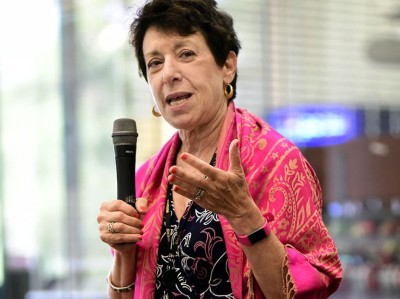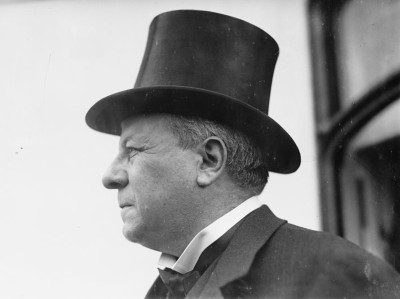Supporters of University of Groningen researcher Susanne Täuber, pictured foreground, protest against her sacking.Credit: Hollandse Hoogte/Shutterstock
A tenured professor who was sacked after speaking out against what she saw as her university’s failure to implement its own equality policy is planning to appeal against her dismissal.
In March, a court ruled that the University of Groningen in the Netherlands could sack Susanne Täuber, a social-psychology and employment-policy researcher, after it found that there was a “permanently disturbed employment relationship” between the two parties.
The ruling on 8 March, International Women’s Day, sparked a demonstration at the university and an outcry among academics around the world, with more than 3,600 signing an open letter calling for Täuber to be reinstated, saying that she was being “punished for exerting her academic freedom”.
“Firing a scholar who published work that is critical of powerful institutions, including the university itself, sets a disturbing precedent for us all,” they wrote.
On 23 March, University of Groningen students staged a sit-in protesting against Täuber’s firing, and highlighting the lack of “social safety” at the university.
Täuber told Nature that she would appeal against her dismissal, which is due to take effect on 1 May.
“I have until June to say that I am not OK with my sacking,” she says. “But then I will have to figure out who will pay for the appeal as I will be unemployed.”
Why Joe Biden’s bid to restore scientific integrity matters
Täuber, who is German, has worked at Groningen since 2009. In 2013, she was awarded a five-year Rosalind Franklin fellowship, a university scheme aimed at female academics, mostly those who are non-Dutch.
In 2018, she made an official complaint that she had been passed over for promotion, arguing that she had as many published papers and research grants as colleagues who had been promoted above her.
An ‘immense discrepancy’
The following year, Täuber authored an article in the Journal of Management Studies1 highlighting the “immense discrepancy between the university’s gender equality policy on paper, and my actual experiences at work”.
In her article, she wrote that the fellowship worked against those whom it was intended to promote, particularly international fellows. Those who were awarded the highly competitive fellowship were senior academics, but they were hired at the lowest level, that of assistant professor. There was also pushback among some male academics who felt that such schemes meant that recipients were being “preferentially treated”.
A 100th birthday wish: uphold academic freedom in dark times
Täuber said that, as a researcher in the field of employment policies, it was her duty to speak out. “I’ve been acknowledged as an expert on the topic by my colleagues, both within and outside of the university, so it was important for me to write that article,” she said, adding that universities should be able to withstand public criticism. “They are being paid with public money, so they should be held to account.”
Casual Groningen — a collective of university employees — tweeted in February that “at any well-functioning institution, Täuber’s ‘critical essay’ should lead to constructive conversations to improve working conditions”. Instead, the university “chose to retaliate”.
The university would not comment on Täuber’s case, but court documents show that a manager described the article as “inappropriate and damaging” to the university and Täuber’s department, as well as to individual members of staff. After it was published, managers asked Täuber to undergo a mediation, development and coaching programme so that she could build her ‘soft skills’. Täuber says that she attended several mediation sessions, but that the development and coaching programme did not take place.
After the relationship broke down, and efforts to assign her to a different department were unsuccessful, the university applied to the local district court to terminate her employment contract — a step that it was required to take because she had tenure.
How we boosted the number of female faculty members at our institution
The 16-page court ruling does not make a judgement on whether bullying or discrimination took place — but it does say that, although both parties are to blame for the “seriously disrupted working relationship”, the university “played an important, if not a decisive, role” in creating it.
However, Täuber thinks her case shows that whenever an academic has criticized their institution, their line manager can claim that doing so “disturbed the working relationship” — a judgement that, in the Netherlands, will always lead to dismissal.
Academic freedom: a dream, not a reality
She says that hers is not an isolated case: a survey she undertook at the university found that of 26 employees who had made official complaints of harassment, 16 had reported being further bullied.
Natalie Scholz, a historian at the University ofAmsterdam, said the reason Täuber’s dismissal has sparked such anger is that it has made many academics fear similar treatment if they criticize their own institutions. The case has even sparked its own social media hashtag: #AmINext.
Susanne had a tenured position. If a university fires somebody who is well known in that specific field, then it looks like no one is safe … Nobody can expect to be able to speak out,” she said.
“This case shows you cannot rely on university management to help you. We need a body that is completely independent of universities, where you can go to report complaints,” she added.
Nature Career Guide: Recruitment
On 15 March, Täuber addressed a webinar on academic freedom hosted by AOB, a Dutch education trade union. Fellow panellist Rosanne Hertzberger, a microbiologist at the Free University of Amsterdam, described academic freedom as a dream, not a reality, and said that freedom for one person is a threat to others.
Täuber is a member of the Academic Parity Movement, a global campaign to end bullying and discrimination in academia. Morteza Mahmoudi, a precision-health specialist at Michigan State University in East Lansing and the co-founder and director of the movement, says:
“Bullying slows down the evolution of science. Many smart people leave academia and public money gets wasted. And the sad thing is that the outcomes of cases like Susanne’s send a very clear signal to other perpetrators that they will be protected, and a negative signal to targets that they should use the code of silence.”












More News
Author Correction: Stepwise activation of a metabotropic glutamate receptor – Nature
Changing rainforest to plantations shifts tropical food webs
Streamlined skull helps foxes take a nosedive